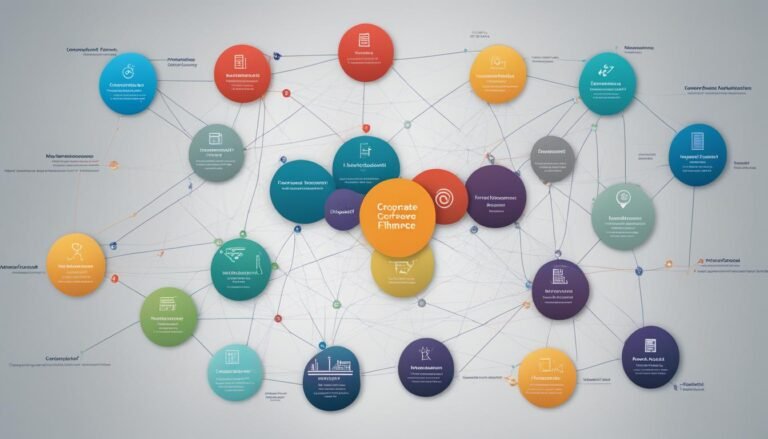Sustainable Finance Trends: 2024 Insights
The 2024 edition of MSCI’s Sustainability and Climate Trends to Watch highlights key questions and trends in sustainable finance for the year ahead. This report emphasizes the financial risks associated with environmental, social, and governance factors and explores emerging trends such as extreme weather impacts, corporate oversight, AI management, supply-chain due diligence, and corporate climate disclosures.
Key Takeaways:
- Extreme weather events pose significant financial risks to both individuals and businesses.
- Corporate oversight and governance are gaining attention as investors and regulators demand transparency and accountability.
- The integration of AI technology in sustainable finance strategies presents challenges and opportunities.
- Supply-chain due diligence is a crucial focus in understanding and addressing ESG risks.
- Increased disclosure of climate-related initiatives and risks by companies enhances transparency and accountability.
Extreme Weather Hits Home and Work
The MSCI report identifies extreme weather as a significant trend in 2024, with increasing impacts on both individuals and businesses. Climate change-related events like hurricanes, floods, and wildfires pose financial risks to companies and investors. This trend underscores the importance of considering climate risk in financial decision-making and developing resilience strategies.
Extreme weather events caused by climate change are becoming more frequent and severe, affecting communities, infrastructure, and the global economy. The economic costs of these events are substantial, with damages and losses estimated in the billions of dollars annually.
Investors are waking up to the reality that extreme weather events can have a significant impact on their portfolios. Severe weather can disrupt supply chains, damage physical assets, and lead to business interruptions. Companies exposed to these risks may face reputational damage, legal liabilities, and increased insurance costs.
Climate risk should be a key consideration for investors and financial institutions. By integrating climate risk assessments into investment decisions, individuals and organizations can better understand and manage the potential impacts of extreme weather on their portfolios.
“As extreme weather events become more frequent, it is imperative for investors to consider the financial risks associated with climate change. By factoring climate risk into investment decisions, we can proactively identify opportunities and protect portfolios against future vulnerabilities.”
The Financial Impacts of Extreme Weather
The financial consequences of extreme weather events are far-reaching. Let’s explore some of the key impacts:
| Impact | Description |
|---|---|
| Physical Damage | Extreme weather events can cause significant damage to infrastructure, buildings, and other physical assets. |
| Business Interruptions | Severe weather can disrupt business operations, leading to revenue losses and increased costs. |
| Supply Chain Disruptions | Extreme weather events can disrupt supply chains, impacting the availability of goods and services. |
| Increased Insurance Costs | Insurance premiums often rise in response to rising climate risks, affecting companies’ bottom line. |
| Regulatory and Legal Liabilities | Companies may face legal liabilities and regulatory actions if their activities contribute to climate change or fail to address climate-related risks. |
Building Resilience and Mitigating Climate Risk
Given the increasing frequency and severity of extreme weather events, companies and investors must prioritize resilience and risk mitigation strategies. Here are some key considerations:
- Conducting climate risk assessments: Companies and investors should assess the vulnerability of their assets and portfolios to extreme weather events. This analysis can inform risk mitigation measures.
- Enhancing physical infrastructure: Implementing measures to strengthen infrastructure and buildings can help minimize the impacts of extreme weather.
- Supply chain diversification: Diversifying supply chains across geographically different regions can reduce the risk of disruptions caused by extreme weather in a particular area.
- Engaging with stakeholders: Companies should collaborate with government agencies, communities, and other stakeholders to develop climate resilience strategies.
- Investing in renewable energy: Shifting investments towards renewable energy sources helps mitigate climate change and reduces reliance on fossil fuels, which contribute to extreme weather events.
By recognizing the financial implications of extreme weather events and taking proactive measures to mitigate climate risk, companies and investors can protect their assets, contribute to a more sustainable future, and build a resilient global economy.
Spotlight on Corporate Oversight
The growing focus on corporate oversight and governance is a key trend highlighted in the MSCI report for 2024. This trend specifically addresses environmental, social, and governance (ESG) risks that impact companies’ long-term value. Investors and regulators are increasingly demanding transparency and accountability from companies, pushing for improved sustainability performance and reporting practices.
Recognizing that ESG risks are also financial risks, companies are now realizing the importance of integrating ESG factors into their decision-making processes. This shift in mindset reflects a broader understanding that responsible corporate oversight is crucial for long-term success.
Investing in companies that prioritize ESG factors has become increasingly attractive to investors, as this approach aligns with responsible finance practices. By considering corporate oversight and governance, investors can evaluate a company’s overall performance and its potential for sustainable growth.
Transparency and Accountability
One of the main drivers behind the focus on corporate oversight is the demand for transparency and accountability. Investors want to know if companies are effectively managing their ESG risks and if they have robust governance structures in place.
“Investors are no longer satisfied with just financial performance. They want to see that companies are proactively managing ESG risks and are held accountable for their impact on the environment and society.” – Michael Johnson, Head of ESG Research at MSCI
Regulators are also stepping up their efforts to ensure that companies disclose relevant ESG information. This has led to the introduction of reporting frameworks and standards that aim to enhance transparency and comparability across industries.
Improving Sustainability Performance
Corporate oversight goes hand in hand with improvements in sustainability performance. Companies are recognizing that by addressing ESG risks and prioritizing sustainable practices, they can enhance their long-term value and mitigate potential risks.
Integrated sustainability strategies, which take into account environmental and social factors, can drive innovation, reduce costs, and improve stakeholder relations. By embedding sustainability into their core business operations, companies can create value for both shareholders and society as a whole.
Enhancing Reporting Practices
As the focus on ESG risks and corporate oversight increases, companies are reevaluating their reporting practices to meet the growing demands of investors and other stakeholders.
“Companies need to provide accurate, relevant, and timely information on their ESG performance to build trust with investors and maintain a social license to operate.” – Sarah Thompson, Chief Sustainability Officer at XYZ Corporation
Enhanced reporting practices involve not only providing data but also ensuring the data is reliable and comparable. Companies are adopting internationally recognized reporting frameworks such as the Global Reporting Initiative (GRI) and the Sustainability Accounting Standards Board (SASB) to standardize their ESG disclosures.
By improving reporting practices, companies can better communicate their sustainability efforts and demonstrate their commitment to corporate oversight and ESG risk management.
Managing AI
As AI technology continues to advance and permeate various industries, its management and impact on sustainable finance are critical considerations. The MSCI report explores the challenges and opportunities of integrating AI into sustainable investment strategies, highlighting its potential to revolutionize the sector.
Enhanced Risk Assessment and Robust Investment Strategies
AI has the power to enhance risk assessment in sustainable finance by analyzing vast amounts of data and identifying patterns that humans may miss. By leveraging AI analytics, investment professionals can make more informed decisions and develop robust strategies that consider environmental, social, and governance (ESG) factors.
“AI-driven risk assessment allows for more accurate evaluation of the long-term performance potential of sustainable investments.”
Moreover, AI can aid in future-proofing investment strategies by predicting market trends, identifying emerging risks, and adapting to changing regulations. This adaptive capability ensures that sustainable finance solutions remain effective and aligned with evolving ESG standards.
Innovative Solutions for Sustainable Finance
The integration of AI in sustainable finance enables the development of innovative solutions that address complex challenges. For example, AI-powered platforms can aggregate and analyze ESG data, providing investors with a comprehensive overview of companies’ sustainability practices. This actionable information empowers investors to make informed decisions that align with their values.
Additionally, AI-driven algorithms can optimize portfolio construction by balancing financial performance with sustainability objectives. By incorporating ESG metrics and impact assessments, these algorithms can identify investment opportunities that generate positive environmental and social outcomes.
The Importance of Ethical AI
While AI offers significant potential in sustainable finance, it is essential to prioritize ethical considerations. Responsible AI implementation involves addressing concerns such as bias, transparency, and data privacy to ensure AI-driven solutions align with sustainable finance principles.
By effectively managing AI and integrating it into sustainable investment strategies, finance professionals can unlock new opportunities, improve risk management, and contribute to the advancement of sustainable development goals.
Supply-Chain Due Diligence
In the realm of sustainable finance, supply-chain due diligence has emerged as a crucial trend in 2024. Companies and investors alike are recognizing the need for robust practices to understand and address environmental, social, and governance (ESG) risks within their supply chains. By thoroughly assessing their supply chains, organizations can identify and mitigate potential sustainability challenges, ultimately fostering greater transparency and responsible business practices.
One key driver behind supply-chain due diligence is the alignment with the sustainable development goals (SDGs) set by the United Nations. The SDGs provide a global framework for achieving a sustainable and inclusive future, emphasizing responsible sourcing, ethical business practices, and the protection of human rights. By integrating supply-chain due diligence into their operations, businesses can actively contribute to the attainment of these goals.
Addressing ESG Risks in the Supply Chain
Effective supply-chain due diligence involves a comprehensive assessment of ESG factors throughout the entire supply network. This process enables companies to identify potential risks related to environmental impacts, labor conditions, human rights, and compliance with sustainability standards. By implementing adequate due diligence measures, organizations can anticipate and proactively address these risks, safeguarding their brand reputation and financial performance.
The Role of Technology and Collaboration
Embracing technology is instrumental in achieving efficient and effective supply-chain due diligence. Solutions such as blockchain, AI-powered analytics, and traceability platforms enable companies to track and verify sustainability claims, ensuring transparency and accountability within their supply chains. Collaborative efforts among stakeholders, including suppliers, NGOs, and industry associations, enhance the effectiveness of supply-chain due diligence by disseminating best practices and collectively driving positive change.
The Business Case for Supply-Chain Due Diligence
Investors are increasingly recognizing the value of supply-chain due diligence in evaluating investment opportunities. They understand that businesses that prioritize ESG factors in their supply chains are better positioned to manage risks, enhance profitability, and attract responsible capital. By integrating supply-chain due diligence into their investment decision-making, investors can align their portfolios with sustainable development goals and contribute to positive environmental and social outcomes.
| Benefits of Supply-Chain Due Diligence | Impacts |
|---|---|
| Enhanced risk management | Minimizes potential ESG risks in the supply chain, protecting company reputation and financial performance. |
| Improved brand image | Positions the company as a responsible and sustainable business, attracting customers and partners aligned with ethical values. |
| Access to responsible capital | Attracts investors interested in sustainable opportunities and bolsters the company’s access to funding. |
| Positive social and environmental impacts | By prioritizing responsible sourcing, companies can contribute to the well-being of local communities, protect ecosystems, and support sustainable livelihoods. |
Corporate Climate Disclosures
In 2024, one of the key focuses in sustainable finance trends is climate disclosures. It is becoming increasingly important for companies to report their climate-related risks and initiatives to investors and stakeholders. The push for transparency and accountability is driven by regulatory bodies like the Corporate Sustainability Reporting Directive (CSRD) in the EU and the Securities and Exchange Commission (SEC) in the U.S. These bodies aim to standardize and enforce climate reporting requirements, ensuring that companies provide accurate and comprehensive information.
Increased transparency and accountability are essential elements of responsible finance. By disclosing climate-related information, companies are not only meeting regulatory obligations but also building trust and demonstrating their commitment to addressing climate risks.
“Transparency is key in sustainable finance. Companies need to provide investors and stakeholders with clear and reliable information about their climate-related risks and opportunities. This allows for better decision-making and more effective allocation of resources.”
Climate disclosures enable investors and stakeholders to assess the sustainability and resilience of companies’ operations and strategies. They provide insights into the potential financial impacts of climate change on businesses and help investors make informed decisions based on these risks.
To illustrate the importance of climate disclosures, here is a table showcasing two companies with contrasting approaches:
| Company | Climate Disclosures |
|---|---|
| Company A | Partial disclosure of climate-related risks and opportunities. Lack of detailed information on strategy and targets. |
| Company B | Comprehensive disclosure of climate-related risks and opportunities. Clear strategy, targets, and progress towards emissions reduction goals. |
The example above highlights the importance of comprehensive climate disclosures. Company B demonstrates a commitment to transparency and provides actionable information to investors and stakeholders, fostering trust and attracting sustainable investment.
Benefits of Climate Disclosures
- Enhanced investor confidence: Transparent disclosure allows investors to assess climate-related risks and make informed investment decisions.
- Improved risk management: Companies gain a better understanding of their vulnerability to climate risks and can develop strategies to mitigate those risks.
- Opportunity identification: Climate disclosures can uncover potential opportunities for companies to capitalize on the transition to a low-carbon economy.
- Stakeholder engagement: Transparent reporting fosters closer relationships with stakeholders who are increasingly concerned about climate and sustainability issues.
By embracing climate disclosures, companies contribute to the shift towards responsible finance and create a more sustainable future.
Private Debt Takes a Seat at the Climate-Transition Table
The MSCI report highlights the emerging role of private debt in climate finance in 2024. Private debt investments are increasingly being channeled towards climate transition projects, contributing to the financing of sustainable initiatives. This trend reflects the growing recognition of the financial opportunities and risks associated with the transition to a low-carbon economy.
The Growing Importance of Private Debt in Climate Finance
Private debt, which encompasses non-publicly traded debt securities, is playing an increasingly critical role in driving climate finance. As governments, organizations, and individuals alike prioritize sustainability efforts, private debt has emerged as a powerful tool for funding climate transition projects.
Private debt investments offer unique advantages in climate finance, including:
- Flexibility: Private debt instruments can be tailored to the specific needs of climate-related projects, accommodating varied sizes and maturity profiles.
- Speed: Private debt financing can be executed more quickly than traditional public market offerings, facilitating rapid deployment of capital to address urgent climate challenges.
- Alignment: Private debt investors can directly align their capital with sustainable objectives, enabling them to actively contribute to and support the transition to a low-carbon economy.
By financing climate-related initiatives, private debt investments can drive positive environmental and social impacts, helping to mitigate climate change, promote renewable energy solutions, and foster sustainable development.
A Table Demonstrating Private Debt’s Impact on Climate Transition Projects
| Private Debt Investments in Climate Transition Projects | Key Benefits |
|---|---|
| Financing renewable energy infrastructure | Contributes to the reduction of carbon emissions and dependence on fossil fuels |
| Funding sustainable transportation projects | Promotes greener modes of transportation and reduces reliance on carbon-intensive methods |
| Supporting energy-efficient building initiatives | Encourages sustainable construction practices and reduces energy consumption |
| Investing in climate-resilient agriculture | Enhances food security, improves resilience to climate-related risks, and promotes sustainable farming practices |
Private debt investments are demonstrating their ability to drive climate transition projects across various sectors, positively impacting communities and the environment while generating attractive financial returns. As the world accelerates its efforts towards a sustainable future, private debt is taking its rightful seat at the climate-transition table, helping to shape a more resilient and low-carbon economy.
Note: The table above provides a snapshot of private debt investments in climate transition projects and their associated benefits. It is not an exhaustive list and serves to demonstrate the broad scope of private debt’s impact in driving sustainability.
Investing in Nature
Investing in nature and green solutions is a significant trend in sustainable finance for 2024. As the world grapples with the pressing challenge of climate change, allocating financial resources towards renewable energy projects, conservation efforts, and other nature-based solutions has become crucial.
The MSCI report underscores the importance of green investing and renewable energy investment as means to combat climate change and achieve the sustainable development goals. By directing capital towards these initiatives, investors can contribute to the mitigation of greenhouse gas emissions, the preservation of natural resources, and the transition towards a greener, more sustainable economy.
Renewable energy investment encompasses a wide range of sustainable energy sources, including solar, wind, hydro, and geothermal power. These investments not only reduce reliance on fossil fuels but also foster the development of clean, renewable energy alternatives that have a lower carbon footprint.
Conservation efforts, on the other hand, focus on preserving and protecting natural habitats, biodiversity, and ecosystems. Investing in the protection and restoration of forests, wetlands, and other natural landscapes has significant environmental benefits, including carbon sequestration, water purification, and the preservation of endangered species.
Investing in nature and supporting renewable energy projects is not only financially prudent but also environmentally responsible. By aligning investment strategies with sustainable practices, investors can contribute to a greener future while generating positive returns.
Furthermore, investing in nature offers potential opportunities for diversification within investment portfolios. As the demand for renewable energy and nature-based solutions grows, there is an emerging market for green bonds, exchange-traded funds (ETFs), and other investment vehicles that focus on sustainable and environmentally friendly assets.
Key Benefits of Investing in Nature:
- Reduction of greenhouse gas emissions
- Protection of natural resources
- Enhancement of biodiversity
- Creation of sustainable jobs and economic growth
- Opportunities for diversification within investment portfolios
By embracing green investing and renewable energy investment, individuals, businesses, and financial institutions can make a tangible impact on the fight against climate change and contribute to a more sustainable future for generations to come.
Conclusion
As we look ahead to 2024, it is evident that responsible finance and impact investing are becoming increasingly important in the world of sustainable finance. The trends outlined in this report highlight the need to integrate environmental, social, and governance (ESG) factors into financial decision-making.
Climate risk, corporate oversight, AI management, supply-chain due diligence, and climate disclosures are key areas of focus for investors and companies. Recognizing the financial risks associated with these factors, they are actively working to develop strategies that drive positive environmental and social impacts.
By embracing responsible finance, investors and companies are contributing to the transition towards a more sustainable and resilient global economy. They are recognizing that sustainable investment strategies not only align with their values but also have the potential to generate long-term financial returns.
As we continue to navigate the complexities of the 21st century, responsible finance and impact investing will play a crucial role in creating a more equitable and sustainable future. By prioritizing ESG factors and embracing sustainable practices, we can build a financial system that not only safeguards our planet but also promotes economic growth and social well-being for generations to come.







